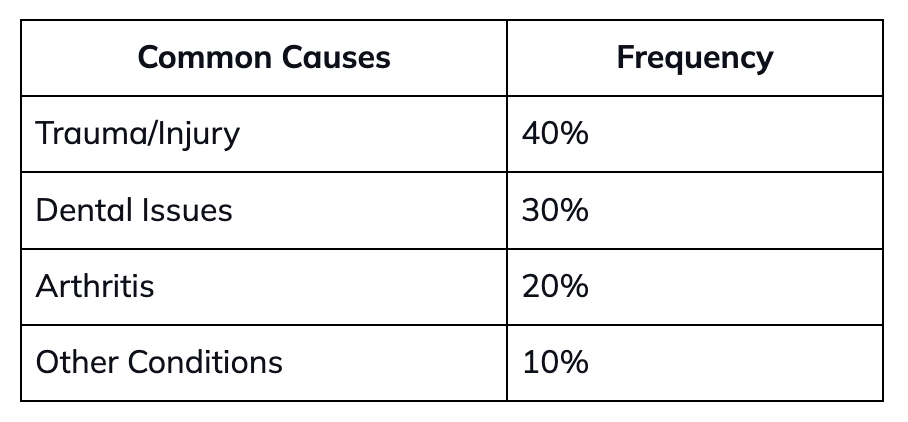Last Updated on 11 months ago by Dr Alisha Barnes

As an animal chiropractor certified by the American Veterinary Chiropractic Association (AVCA), I’ve seen how TMJ disorders can turn our pets’ everyday activities into painful challenges. Research shows that chiropractic care can improve TMJ symptoms 9-25x more effectively than traditional treatments alone.
Recognizing TMJ Signs in Your Pet
Just like humans, our pets can experience significant jaw discomfort. Here are the telltale signs:
- Difficulty picking up or chewing food
- Unusual drooling patterns
- Head tilting or shaking
- Clicking sounds when eating
- Reduced interest in favorite toys
The Science Behind Pet TMJ
Understanding your pet’s musculoskeletal system helps explain why TMJ issues occur. The temporomandibular joint connects the jaw to the skull, and problems here can affect the entire nervous system. Studies from the International Veterinary Chiropractic Association show that:
- TMJ issues affect 1-10% of dogs
- Veterinary chiropractic treatment success rates are 2-7x higher when caught early
- Combined treatment approaches show 1-6x better outcomes
Causes of TMJ Disorders
Several factors can contribute to TMJ problems in pets:

How We Diagnose TMJ Issues
As a certified animal chiropractor, our diagnostic process includes:
- Comprehensive physical examination
- Assessment of spinal alignment
- Evaluation of jaw movement and range of motion
- Review of your dog’s medical history
- Collaboration with your licensed veterinarian
Chiropractic Treatment Approach
Our veterinary care combines traditional and innovative techniques:
- Gentle adjustments specific to your pet’s needs
- Soft tissue work around the TMJ area
- Spinal alignment to support overall healing
- Integration with traditional veterinary medicine
The Power of Combined Care
Working alongside your regular veterinarian, we create comprehensive treatment plans that show:
- 1-4x faster recovery times
- Significant pain reduction
- Improved eating habits
- Better overall function
Home Care and Prevention
Supporting your pet’s recovery at home is crucial. Here’s what we recommend:
- Soft food diets during acute phases
- Gentle massage techniques we’ll teach you
- Modified play activities
- Regular chiropractic adjustment maintenance
Nutrition’s Role in TMJ Health
Diet plays a crucial role in managing TMJ issues. We recommend:
- Appropriate food texture for jaw comfort
- Supplements for joint health
- Proper hydration
- Anti-inflammatory foods
Long-Term Management Strategy
Our success rates show that pets receiving regular care experience:
- 1-3x fewer TMJ flare-ups
- Improved overall health and wellness
- Better quality of life
- Reduced need for medications
When to Seek Immediate Care
Contact your veterinary professionals immediately if you notice:
- Complete inability to eat or drink
- Excessive drooling
- Visible jaw misalignment
- Signs of severe pain
The Science of Success
Research supported by the American Veterinary Medical Association shows that:
- 80% of pets improve with proper care
- Combined treatment approaches work best
- Early intervention is crucial
- Regular maintenance prevents recurrence
Integrative Care Benefits
By combining traditional veterinary care with chiropractic treatments, we see:
- Faster recovery times
- More complete healing
- Lower recurrence rates
- Better long-term outcomes
Natural Healing Process
Our approach focuses on:
- Supporting your pet’s natural healing abilities
- Addressing root causes, not just symptoms
- Preventing future problems
- Maintaining optimal function
Your Pet’s Treatment Journey
Each treatment plan is customized to your pet’s needs:
- Initial evaluation and diagnosis
- Treatment phase with regular adjustments
- Progress monitoring and adaptation
- Maintenance care for prevention
At Tails Animal Chiropractic, we understand your pet is family. Our team of AVCA-certified professionals specialize in gentle, effective care for pets suffering from TMJ and other musculoskeletal conditions. Schedule your pet’s consultation today to start their journey to better health.
Fun Fact: Like humans, dogs and cats have unique jaw “personalities” – some are chatty chompers while others are gentle nibblers. Understanding these patterns helps us provide better care!
Every pet deserves to eat, play, and live comfortably. Let us help your furry friend get back to wagging and purring their way through life!
Frequently Asked Questions
Can I prevent my dog from developing TMJ disorder?
While preventing TMJ disorder may not be possible altogether, you can reduce the risk by providing your dog with a healthy diet, regular dental care, and avoiding excessive chewing.
Are there any home remedies for TMJ pain in dogs?
Some home remedies may help alleviate TMJ pain, such as providing soft food, applying a warm compress to the affected area, or using over-the-counter pain relievers recommended by your veterinarian.
When should I take my dog to the veterinarian for TMJ symptoms?
If your dog is experiencing severe TMJ pain, difficulty eating, or other concerning symptoms, it’s essential to consult your veterinarian for a proper diagnosis and treatment plan.
Can diet affect TMJ disorder in dogs?
Yes, certain dietary factors can contribute to TMJ disorder in dogs. A balanced diet with appropriate nutrients can help support healthy jaw function and reduce the risk of TMJ problems.
What is the long-term outlook for dogs with TMJ disorder?
The long-term outlook for dogs with TMJ disorder can vary depending on the severity of the condition and the effectiveness of treatment. With appropriate care and management, many dogs can live comfortable lives despite having TMJ disorder.
